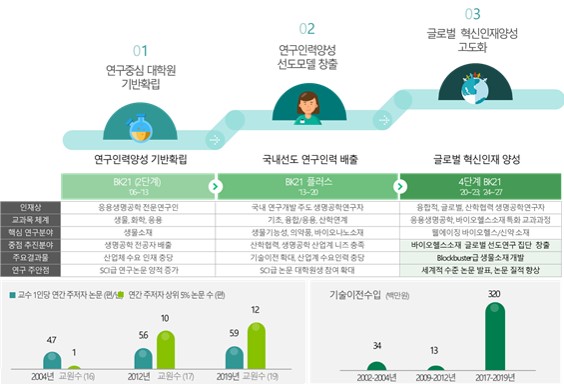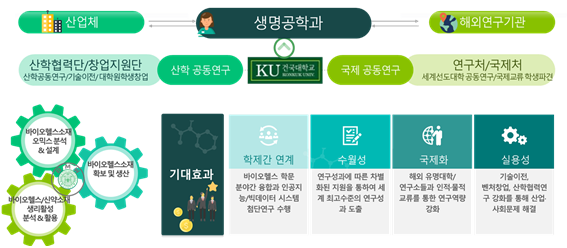
❍ 건국대학교는 2001년 전문컨설팅기관인 A. T. Kearney 사에 경영진단을 의뢰하였고, 컨설팅결과를 바탕으로 생명공학 분야를 대학 특성화분야로 선정하여 20여 년 동안 대학원 생명공학과를 건국대학교 선단(Flagship) 학문단위로 설정하였음. 대표적으로 건국대학교 PRIDE-KU사업 연구중심학과로 선정되어(2013년-2017년) 4년간 7억 2천만원 교비 지원받았으며, 지금까지 BT 인재 양성 학문 단위로 본부의 행/재정적 지원을 받음.
❍ 대학원 생명공학과는 생명/분자정보학센터를 교내 특성화연구소로 설립하고 전폭적으로 지원하여 2004년부터 1단계 5년간 교육부 이공계 중점연구소로 지정된 이래 2단계 9년 사업에도 재지정되어 2018년까지 대학원 생명공학과 참여교수들의 협력 연구와 첨단 생명정보학 융합연구의 허브로 대외 경쟁력 있는 교내연구소의 성공적인 사례가 됨.

❍ 대학원 생명공학과 참여교수 4명이 제안한 생물소재 연구주제는 2010년 9월에 연구재단 기초연구실(BRL) 육성사업에 선정되어 2015년 8월까지 생물소재 관련 연구 성과를 축적하고 관련 산업체에 활용되는 우수 전문인력을 양성하였음.
❍ 대학원 생명공학과는 2006년 및 2013년에 각각 2단계 및 3단계 BK21사업에 [응용생명공학사업단]으로 선정되어 2020년까지 15년에 걸쳐 응용생명공학분야의 고급 대학원 전문인력을 양성하여 명실상부한 생물소재 분야 BT전문 인력 양성의 중추적인 교육연구단의 임무를 수행중에 있음.
학과장 인사말
건국대학교 대학원 생명공학과 (Department of Bioscience & Biotechnology, Graduate School of Konkuk University)에 찾아오신 여러분들을 환영합니다!
대학원 생명공학과는 정부의 우수대학원 인력양성 BK21사업의 지원을 받아 2006년 설립되어 생명공학 전 분야에 걸친 20명의 우수한 교수진의 헌신적인 교육과 연구 역량에 힘입어 지금까지 700여 명의 석/박사학위 인력을 배출한 건국대학교 생명공학분야 선단(flagship) 대학원 프로그램입니다.
대학원 생명공학과에서 학위를 받은 졸업생들은 1) 제약회사, 식품회사, 화장품제조회사 및 바이오기업 연구/개발 담당 전문연구원; 2) 생명공학관련 정부부처 공무원 및 정부출연 연구소 연구원; 3) 의료제제 및 의료진단기기, 고부가가치 바이오소재 생산제조 및 개발, 의약용 화합물 및 항생물질 제조, 의학 및 약학 연구개발, 생물학적 제제 제조 등의 생명공학 전 분야 연구/개발 연구원; 4) 생명공학 관련 대학교원; 5) 국외 대학 진학 및 해외 유명 연구소 취업; 6) 바이오벤처 창업 및 스타트업, 7) 생명공학분야 기술 및 경영/투자 컨설턴트 등의 분야에 진출하여 중추적인 임무를 수행하는 생명공학 일류 학과입니다.
나노바이오, 제약학, 생물공학, 화학공학, 생명정보학, 화장품공학, 천연물화학, 식품공학, 생화학 등 바이오헬스 산업 전 분야에 걸쳐 필요한 학문적 소양을 교육하고 연구하는 유수의 교수진 20명으로 구성된 대학원 생명공학과는 바이오헬스/신약소재 신산업 수요에 부합하는 수월성,국제화,학제간연계및실용성기반 교육/연구를 통하여 지속적으로 융합/창의적인재를양성하겠습니다.
감사합니다.
학과장 소개

김동은 학과장 Dong-Eun Kim
-
 연구실 : 산학협동관 718호, 717호 (실험실)
연구실 : 산학협동관 718호, 717호 (실험실) -
 연락처 : 02-2049-6062
연락처 : 02-2049-6062 -

E-Mail : kimde@konkuk.ac.kr
| 학
력 |
기간 |
학교명 |
전공분야 |
비고 |
| ‘88.03.~‘92.02. |
서울대학교 |
화학 |
학사 |
|
| ‘92.03.~‘94.02. |
서울대학교 |
화학 |
석사 |
|
| ‘95.09.~‘01.03. |
(미국) 오하이오 주립대학교 |
생화학 |
박사 |
Dong-Eun Kim, Ph.D.
Professor of Biochemistry
Department of Bioscience and Biotechnology, Konkuk University
Industry-University Coop. Bldg. (San-Hak-Hyup-Dong-Gwan) Rm #718,
120 Neungdong-ro, Gwangjin-gu,
Seoul 05029,
Republic of Korea
Tel. +82-2-2049-6062; Fax. +82-2-3436-6062
Biography of Dong-Eun Kim, Ph.D.
Dr. Dong-Eun Kim is a Professor of Konkuk University in Seoul, Korea. He obtained his undergraduate degree (1992) and master’s degree in chemistry (1994) from Seoul National University in Seoul, Korea. Dr. Kim received his Ph.D. in biochemistry from the Ohio State University (Columbus, OH) in 2001 under the supervision of Professor Smita S. Patel. Dr. Kim continued his research as a postdoctoral fellow at the University of Medicine and Dentistry at New Jersey (Piscataway, NJ) in 2001.
He has conducted his research as a research associate at the Scripps Research Institute (2002, La Jolla, CA) under supervision by Dr. Gerald F. Joyce. After coming back to Korea, he was appointed to the Department of Biotechnology at Dong-Eui university (Busan, Korea) in 2003 as an Assistant Professor. After spending 4 years as a full-time faculty in Dong-Eui university, he moved to the Department of Bioscience and Biotechnology at Konkuk university in 2007. Dr. Kim was promoted to Associate Professor in 2010 and tenured as Full Professor in 2015. He was appointed as a College Dean in the Konkuk Institute of Technology (KIT) in 2022. Over the past 25 years, Dr. Kim has published 170 peer-reviewed research papers (h-index = 49; i10-index = 135; Nov 2023). He has been funded by several Korean government agencies (2003-present), including National Research Foundation (NRF), Korea Health Industry Development Institute (KHIDI), and Ministry of Trade, Industry & Energy (MOTIE).
Current research in the Kim lab emphasizes topics related with nucleic acid biochemistry and cellular proteostasis in the degenerative diseases; 1) proteostasis via autophagy and immunoproteasome and their relationship with degenerative diseases; 2) genetic diagnostics and bioassay using novel nucleic acid amplification and functional nano-sized materials; 3) mechanism and enzymatic properties of nucleic acid-binding protein; and 4) lipid nano-particles conjugated with nucleic acid aptamers as carriers of therapeutic mRNA and anticancer reagents.
